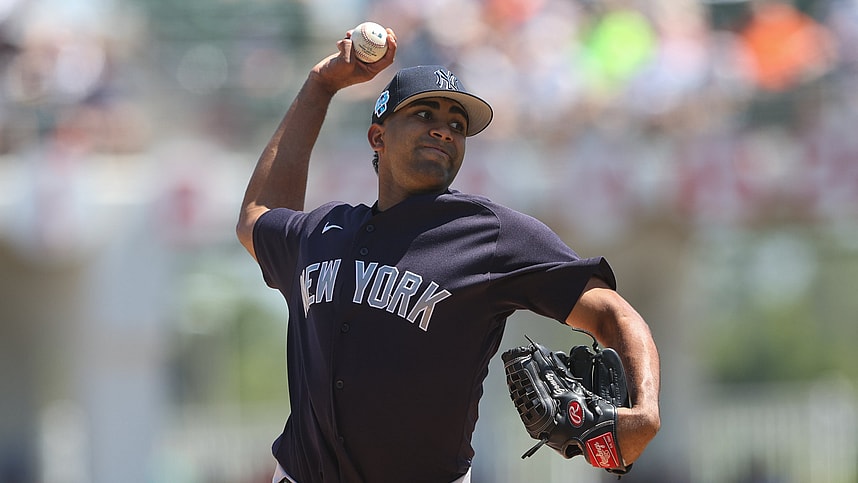
With the Yankees set to have multiple key free agents in their pitching staff, the organization could look to find answers to their problems from within. They possess a strong track record of developing young arms into bullpen roles and have seen some of those names even impact the rotation, but this pipeline of prospects becoming relievers and working their way into the rotation might be a viable strategy for building their rotation. As the Rule-5 deadline approaches, we’ll get a better understanding as to which arms will find their way on the 40-Man Roster and, therefore could impact the team in 2024.
Similar to how Jhony Brito and Randy Vasquez were able to combine for a 3.87 ERA over 128 innings for the Yankees this past season, carving out roles in the Yankees’ pitching staff that could grow even more next season, but who can take that leap into multi-inning usage next season?
The Yankees Might Be Forced to Use Yoendrys Gómez
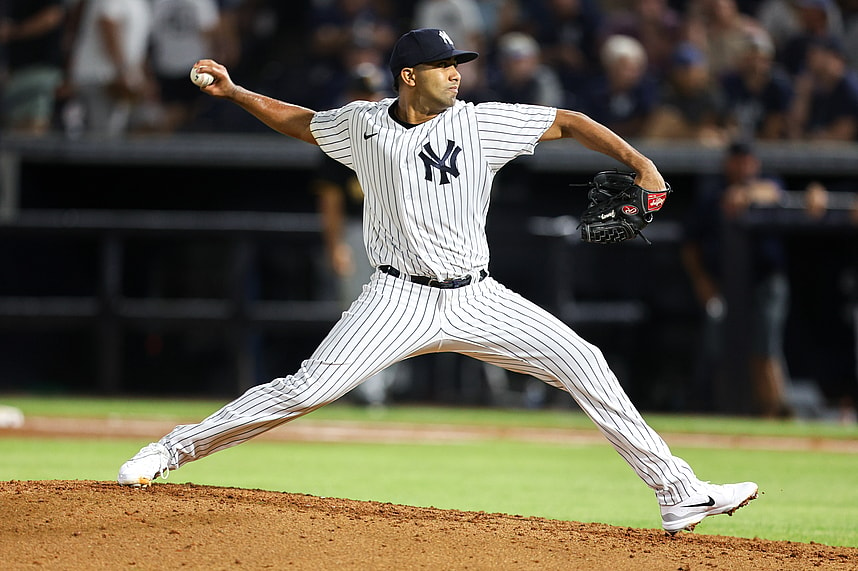
One of the Yankees’ biggest roster challenges will be sorting through names who currently are out of options, and surprisingly, Yoendrys Gómez is one of those names. Despite just having one MLB promotion and appearance to his name, the 23-year-old right-hander out of Venezuela is out of MiLB options for 2024. This could get him traded, but his impressive showing not just in Double-A this past season but in his two-inning sample in the big leagues as well could cause the Yankees to take a leap of faith. His stuff is undeniably very good, and it all starts with a really good four-seamer.
He releases from a low slot with a -4.3° Vertical Approach Angle, and with 16.5″ of Induced Vertical Break as well, it’s designed to play extremely well up in the strike zone. His curveball, changeup, and cutter all work as strong secondary offerings as well, although the command of these secondaries isn’t where it needs to be for him to reliably start at the Major League level. He posted a 3.58 ERA in 65.1 innings, striking out 28.5% of batters faced, although it came with a 13.5% walk rate as well.
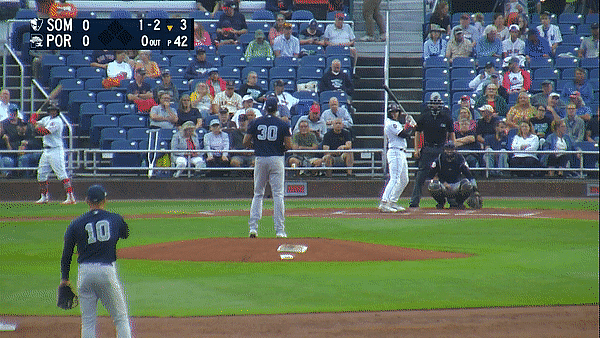
Gómez worked exclusively as a starter with the Somerset Patriots, and perhaps a shorter workload per outing could help his stuff play up and curb some of his command issues. While an extremely small sample, his 106 Stuff+ in his two scoreless frames against the Blue Jays in his debut is certainly encouraging, with his four-seam fastball leading the way at a 120 Stuff+. Already on the Yankees’ 40-man Roster, his strong pitch mix and unique release point could help him flourish in the backend of their bullpen, with the capability to make some spot starts or function as an opener as well.
If he isn’t traded or hurt come Opening Day, the Yankees will have to put him on their roster, and thus he’s the likeliest candidate to break camp with the team on this list.
Reaping the Benefits of the Joey Gallo Trade
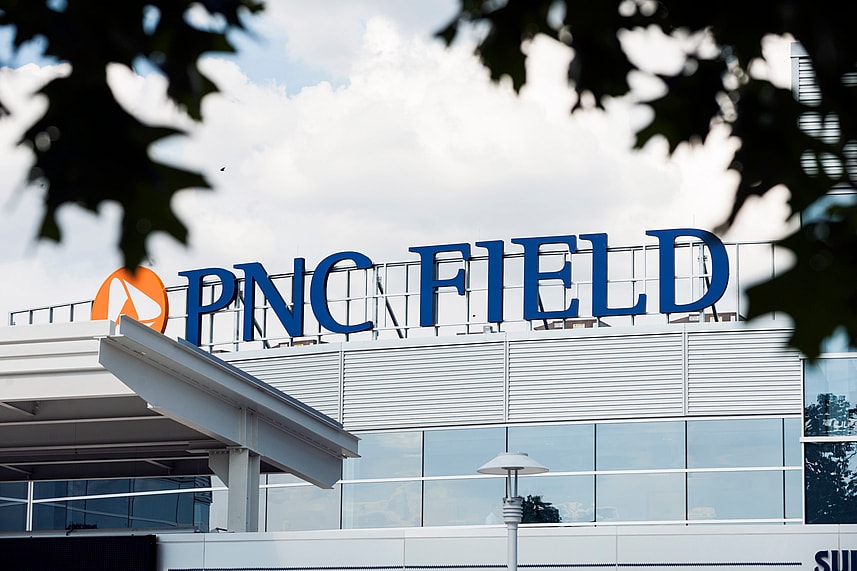
Clayton Beeter might have struggled in Triple-A this past season as a starter, but after an electric start to his season at Double-A and flashes of brilliance with the RailRiders, there’s a clear path for him to be a reliever in this bullpen. He’s Rule-5 eligible this winter, and the Yankees could use one of their MiLB All-Stars to make some spot starts or come out of their bullpen in a multi-inning role. Beeter put up a 3.62 ERA with 165 strikeouts in 131.2 IP, but similarly to Yoendrys Gomez, suffered from poor command.
He features a riding fastball that sits between 93-94 MPH, with his best pitch being a wipeout slider that creates extreme vertical separation off of the four-seamer. Beeter didn’t grade out well in terms of Stuff+ (95.9), but understandably so, with an over-the-top slot and four-seam fastball that possesses just solid vertical movement with solid velocity, however, in the bullpen, we could see an uptick in velocity. We’ve seen Beeter get up to 97 MPH in starts before, and if he can get to those upper percentiles of velocity more frequently in shorter bursts, we could see 94-95 on the fastball to pair with his slider.
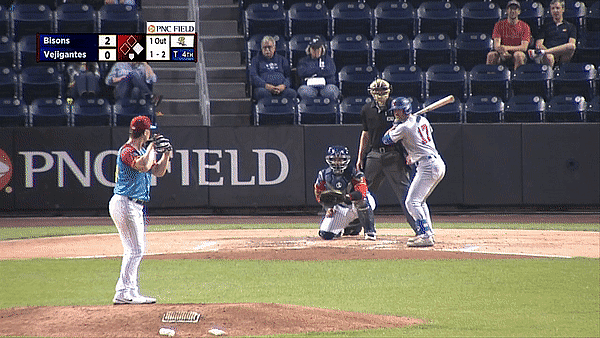
What makes his slider, which generated a 36% Whiff%, such a good pitch is the fact that it has nearly 18 inches of vertical separation off of his four-seam fastball while staying near the zero line in terms of horizontal break at just 2.8″ of glove-side movement. At 83.5 MPH, it doesn’t have above-average velocity for a slider, but the deception created with an over-the-top arm slot definitely makes it hard to pick up for batters as it has a steeper angle that enhances its vertical drop.
Strikeouts aren’t a problem for the 24-year-old right-hander, however, if the Yankees want to get the most out of the Joey Gallo deal, either polishing his velocity or moving him to the bullpen could prove to be fruitful for his MLB career. He’s definitely an arm to be excited for as the team looks to incorporate their farm system more into what they’re doing in 2024.
The Best Stuff in the Yankees’ System?

Will Warren is one of my favorite pitchers, not just in the Yankees’ MiLB system but in all of professional baseball, and that’s due to his ridiculous arsenal. He features a five-pitch mix that includes a sweeper, sinker, four-seamer, slider, and changeup, with his bread-and-butter being his wicked sweeping slider. Coming in at 82.8 MPH and 16.9″ of sweep, this sweeper is one of the best pitches in the entire organization, grading out at a 161.4 Stuff+ and 39.8% Whiff%.
This pitch sets up the rest of his arsenal, including a sinker that freezes batters so often that it has a 31.8% Called Strike + Whiff%, and that’s due to its 15.8″ of run and just 3.8″ of Induced Vertical Break, keeping it in-zone 55.4% of the time. His sinker kept the ball on the ground an astonishing 66.7% of the time, and at 93.6 MPH, the velocity and movement profiles combined for a 137.1 Stuff+, another ridiculous grade for a sinker, and it’s what makes his stuff nearly unhittable for right-handed hitters.
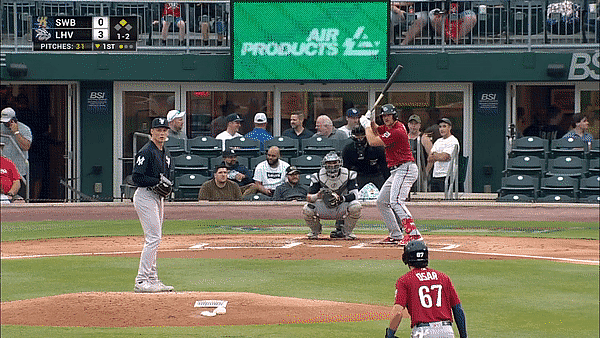
Left-handed hitters did plenty of damage against Warren for most of the season in Triple-A, something that he would have to work on in-season, and he found the two pitches that would prove successful against those opposite-handed opponents. Since horizontal movement plays worse against opposite-handed hitters, his sinker and sweeper didn’t have the same effectiveness against lefties, but vertical movement plays significantly better, which is where his four-seamer and changeup came into play.
In terms of Stuff+, the four-seamer (101) and changeup (86) seem underwhelming, but it’s the vertical tunnel they create that allows it to play above its Stuff+ grades, especially when discussing changeups. Eno Sarris has spoken about the issues with grading changeups without access to biomechanical data (such as arm speed), which plays a role in offspeed success, and while a 22.3% Whiff% certainly isn’t great, it became a more prominent pitch as the season carried on, and with a 68.8% GB%, it proved brilliant in contact prevention, but the four-seamer was the key here.
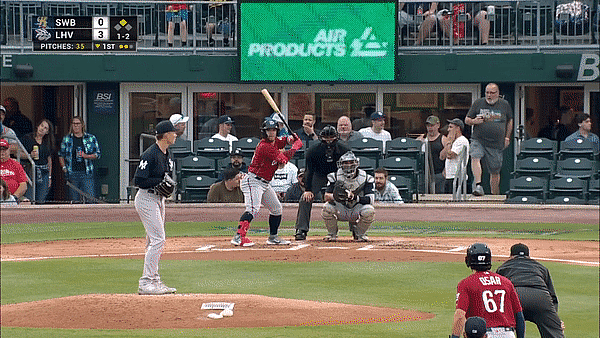
With a 38.6% Whiff%, this pitch outperformed its average Stuff+ grade due to its low-slot release at a -4.5° Vertical Approach Angle, which helped it play up despite just 14″ of Induced Vertical Break. Warren relied on the changeup and four-seamer combination to limit damage against left-handers successfully, finishing the Triple-A season with a 0.63 ERA and 22.7% K-BB%, averaging 5.2 innings per outing in that timespan and propelling himself into the conversation of potentially being a backend t-100 prospect.
He finished the season with a 124.5 Stuff+, far and away the best mark for any pitcher with at least 1,000 pitches in Triple-A this past season. He’ll be somebody the Yankees could develop in a multi-inning reliever role in 2024 and potentially transition him for a starting role at some point down the line. If there’s anybody in this system who best reflects the Yankees’ revamped MiLB development, it’s the 8th Rounder out of the largely unknown Southeastern Louisiana University who became arguably the nastiest starting pitcher in MiLB on a stuff-basis.
More about:New York Yankees